Bishops object to Archbishop of Canterbury’s decision to exclude same-sex spouses from 2020 Lambeth ConferenceMajority of bishops say they will attend to ‘reflect our varied understandings of marriage’ and commitment to LGBTQ+ human rightsPosted Mar 15, 2019 |
|
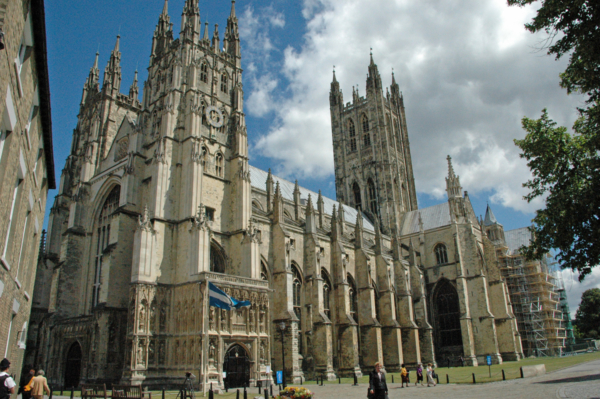
Many of the major liturgies during the Lambeth Conference of bishops take place at Canterbury Cathedral, the seat of the archbishop of Canterbury and what is considered the “mother church” of the Anglican Communion. Photo: Mary Frances Schjonberg/Episcopal News Service
[Episcopal News Service – Hendersonville, North Carolina] The Episcopal Church’s House of Bishops said March 15 that it is “aggrieved and distressed” by Archbishop of Canterbury Justin Welby’s decision to exclude the same-sex spouses of bishops invited to the 2020 Lambeth Conference.
The bishops said they “are concerned by the use of exclusion as a means of building communion.”
Welby says on the website of the gathering of Anglican Communion bishops that he prays that “the Lambeth Conference will reinvigorate the Communion.” The website notes that Welby has invited “every eligible bishop and spouse.”
The majority of the house plans to go to Lambeth, according to the statement. The bishops said they want to continue to build relationships across the communion, “further the conversation around the various cultural expressions of marriage,” and “reflect our understandings of marriage, as well as our commitment to the dignity of all human beings, including the human rights of LGBTQ+ persons.”
The statement passed on a voice vote. At least one bishop, Dan Martins of Springfield, could be heard voting no.
Diocese of New York Bishop Assistant Mary Glasspool currently is The Episcopal Church’s only actively serving bishop who has a same-sex spouse. She addressed the house on March 14.
The Rev. Thomas Brown is due to be ordained and consecrated on June 22 as the next bishop of the Diocese of Maine. He is married to the Rev. Thomas Mousin. The diocese elected Brown on Feb. 9. It is possible that Episcopal Church dioceses will elect bishops with same-sex spouses between now and the July 23, 2020, beginning of the Lambeth Conference.
The only other active bishop in the Anglican Communion to whom Welby’s decision is known to apply is Diocese of Toronto Bishop Suffragan Kevin Robertson. He married Mohan Sharma, his partner of nearly 10 years, on Dec. 28, 2018.
The statement from the House of Bishops includes a statement from the Bishops’ Spouses Planning Group saying they “join our voices with those in The Episcopal Church who have expressed their disappointment and dismay” with Welby’s decision. “We especially stand with our fellow spouse, Becki Sander, spouse of Bishop Mary Glasspool,” they said.
“The spouse community understands that the Anglican Communion is not of one mind with regard to marriage, and that, in the life of the communion, this is a complex issue,” they said. “Exclusion of same-gender spouses, however, seems like a simplistic reaction to this complex issue. It saddens us that all are not welcome to walk, listen, and witness with us, and that all voices will not be heard at this gathering.”
The bishops refused on a 44-42 show of hands to pass a second resolution calling on Presiding Bishop Michael Curry to ask Welby to change his mind. Curry told the house before the vote that he has had “one long conversation” with the archbishop and has exchanged letters with him as well.
“I’ve got to be honest with you, I don’t expect he’ll change, but I’m willing to say that this house really would like it to be reconsidered if there is any way that it can be,” Curry said.
The texts of the bishops’ statement and that of the spouses are here.
Also at the meeting
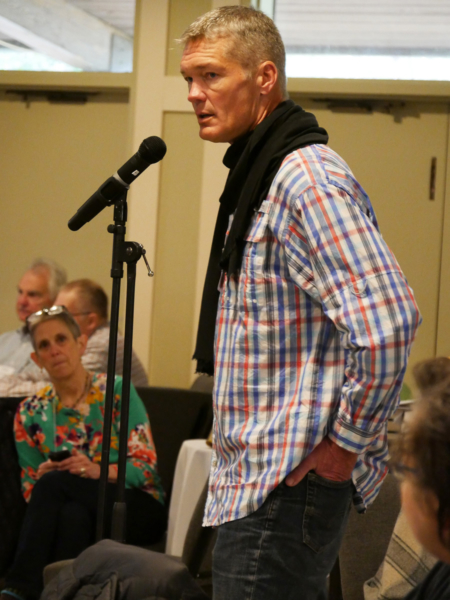
Diocese of San Joaquin Bishop David Rice speaks to the house on March 15, hours after the terrorist attacks on two mosques in Christchurch, New Zealand. Rice once served as a vicar in the Diocese of Christchurch. Photo: Mary Frances Schjonberg/Episcopal News Service
The bishops responded in a number of ways to the attacks on two mosques in Christchurch, New Zealand, in which 49 died. The morning Eucharist included prayers for “the victims of the shootings in New Zealand, rest to their souls and peace to their families.”
Diocese of San Joaquin Bishop David Rice, speaking at the opening of the morning session, called the attacks “an unprecedented act of terrorism.”
Rice was the bishop of the Diocese of Waiapu in the Anglican Church in Aotearoa, New Zealand and Polynesia when he was called to San Joaquin. Born and raised in North Carolina, Rice was a Methodist pastor for eight years prior to his ordination in the Anglican Church.
He began his Anglican priesthood in the Diocese of Christchurch. It is where his daughter and son went to kindergarten and primary school, he told the house. He and his wife, Tracy, have a home there to which they will retire, Rice said.
“I find myself as I stand here before you – and I should have thought of this because I was up all night contacting family and friends to see if they’re OK – to have something to say, but I find I have no words.”
He said he suggested to Diocese of Connecticut Bishop Ian Douglas that Bishops Against Gun Violence reach out to Christchurch Bishop Peter Carrell and Richard Wallace who leads Te Wai Pounamu, the Maori diocese, “as an act of solidarity to send our love.”
Rice evoked the statement from New Zealand Prime Minister Jacinda Ardern who said of the victims of the attacks, “They are us. The person who has perpetuated this violence against us is not. They have no place in New Zealand.”
Rice said, “Say that with me, ‘They are us.’” The house responded loudly, and Rice stopped to compose himself.
“Our immigrant and refugee sisters and brothers, say it with me, ‘They are us.’”
The house responded, “They are us.”
“Our Palestinian sisters and brothers, say it with me, ‘They are us.’”
The house responded, “They are us.”
“Those who even lose their way and do harm, say it with me, ‘They are us.’”
The house responded, “They are us.”
“Amen,” Rice said, returning to his table.
The bishops prayed in silence and then were led in prayer by the Very Rev. Miguelina Howell, a chaplain to the house and dean of Christ Church Cathedral in Hartford, Connecticut.
Later in the day, the members of Bishops Against Gun Violence who were at the meeting gathered for the group’s weekly Facebook Live prayer service, held this Friday in the chapel at Kanuga Conference and Retreat Center. The vigil included remarks by Curry.
The House of Bishops passed a resolution committing itself to upholding General Convention Resolution D034, which suspends for three years the canon (church law) that places a time limit on initiating proceedings in cases of clergy sexual misconduct against adults. The church has no time limit on reporting clergy sexual misconduct against children and youth under age 21.
The resolution affirms that the bishops are “intent on having robust pastoral response in all matters regarding sexual misconduct regardless of when that alleged misconduct occurred.”
Diocese of Central New York Bishop DeDe Duncan-Probe later told the house that the group that planned the Liturgy of Listening during the 2018 General Convention has assembled a toolkit for other Episcopalians to use for similar services.
“It is our responsibility as bishops to make sure everyone is safe and to respond well when that is not true,” she said.
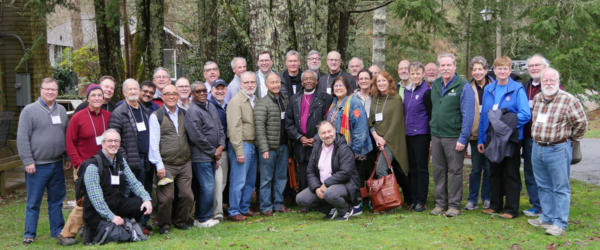
The bishops who have taken The Episcopal Church’s pledge to protect and renew the Earth and those who live on it gathered March 15 under the trees at Kanuga Conference and Retreat Center to record a video invitation for the rest of the church to join them. Photo: Mary Frances Schjonberg/Episcopal News Service
The bishops also voted to “commit ourselves, individually and corporately to live the Way of Love, practices for a Jesus-centered life, and we ask every member of The Episcopal Church to consider joining us in meeting and following Jesus through the Way of Love.”
Convocation of Episcopal Churches in Europe Bishop Suffragan Pierre Whalon proposed the resolution, saying it grew out of the previous three days of exploring the Way of Love.
Whalon and some colleagues discussed how the Way of Love could develop into a de facto strategy for the church’s mission if the bishops committed to live the Way of Love and invited other Episcopalians to join them.
“We’ve had a lot of things come down the pike that were supposed to be life-changing programs, and they came along and they just continued down the pike,” Whalon said. “I believe that the Way of Love could be considered yet another program” if the bishops and the entire church do not commit to the practices it outlines.
More information about the Way of Love is here.
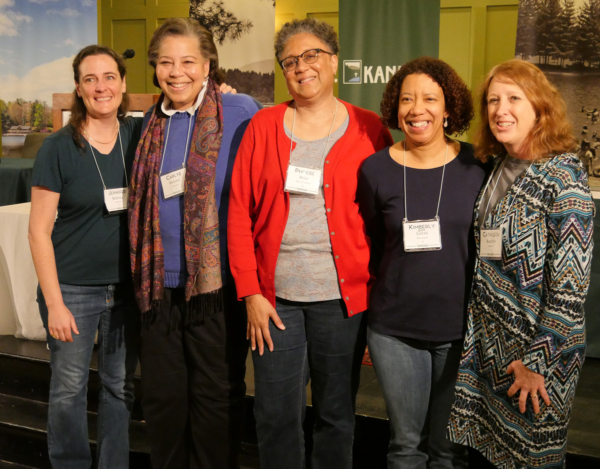
Five women bishops who have been either ordained and consecrated or elected since General Convention in July 2018 attended the March meeting. They are Arizona Bishop Jennifer Reddall, Newark Bishop Carlye Hughes, West Tennessee Bishop-elect Phoebe Roaf, Colorado Bishop-elect Kimberly D. Lucas and Kansas Bishop Cathy Bascom.
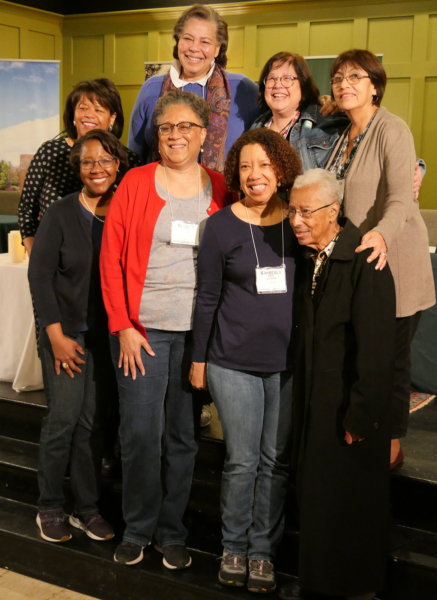
The Episcopal Church House of Bishops’ women of color who attended the Kanuga meeting pose March 14 for a photo. They are, front row left to right, Indianapolis Bishop Jennifer Baskerville-Burrows, West Tennessee Bishop-elect Phoebe Roaf, Colorado Bishop-elect Kimberly D. Lucas, and retired Massachusetts Bishop Suffragan Barbara Harris; and back row, left to right, Massachusetts Bishop Suffragan Gayle Harris, Newark Bishop Carlye Hughes, Bishop Carol Gallagher (serving as Diocese of Massachusetts regional canon), and Cuba Bishop Griselda Delgado del Carpio. Photo: Mary Frances Schjonberg/Episcopal News Service
The House of Bishops met March 12-15. Diocese of Los Angeles Bishop Suffragan Diane Jardine Bruce, the house’s secretary, said 132 bishops attended the meeting, including three bishops-elect. Bishops-elect who have received the canonically required consents to their ordination and consecration are invited to attend the meetings. Retired Bishop Suffragan of Ohio Arthur Williams was the senior bishop present.
Five of the 10 bishops who form the 2018 class are women, marking the first time in the church’s history that a class is evenly divided between women and men. Four of the 10 are persons of color, Diocese of Newark Carlye Hughes, Ecuador Litoral Bishop-elect Cristóbal León Lozano (who did not attend the meeting), Colorado Bishop-elect Kimberly D. Lucas and West Tennessee Bishop-elect Phoebe Roaf.
The gathering is the group’s annual spring meeting. The bishops normally meet each spring and fall during non-General Convention years. They will next meet Sept. 17-20. Spouses are traditionally part of the fall meeting.
– The Rev. Mary Frances Schjonberg is the Episcopal News Service’s senior editor and reporter.

Social Menu